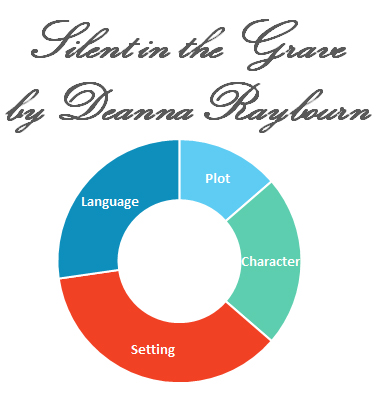Chloe Wynchester is completely forgettable—a curse that gives her the ability to blend into any crowd. When the only father she’s ever known makes a dying wish for his adopted family of orphans to recover a missing painting, she’s the first one her siblings turn to for stealing it back. No one expects that in doing so, she’ll also abduct a handsome duke.
Lawrence Gosling, the Duke of Faircliffe, is tortured by his father’s mistakes. To repair his estate’s ruined reputation, he must wed a highborn heiress. Yet when he finds himself in a carriage being driven hell-for-leather down the cobblestone streets of London by a beautiful woman who refuses to heed his commands, he fears his heart is hers. But how can he sacrifice his family’s legacy to follow true love?
Review:
3.5 stars
The Duke Heist was just what I needed – a romp of a Regency with a caring beta hero who melts my heart.
The good:
- Chloe’s siblings are all orphans, brought together by a rich baron, and I am sold on the found family. Each brother and sister has their own skills, from painting to training animals to disguises, and they prove valuable when trying to steal back a painting that’s rightfully theirs.
- There is a range of rep within the secondary characters – people of color, chronic pain, what appears to be a nonbinary or trans character (no label is given on the page), and perhaps one more queer character (again, no label).
- Laurence is a titled member of society who gives speeches in Parliament, but I would classify him as a beta hero. He is fully aware of his responsibilities, almost to the point of them being painful, and he considers and puts the needs of others first, regardless of their class or station. The care he takes with Chloe is meltworthy.
- Servants are people with names and personalities – everyone, not just the butler or a token ladies’ maid. We get a scene of them sitting around a table with the duke and it’s fun and heartwarming, as well as something I’m not sure I’ve ever seen in a Regency before.
- While the conflict appears to be enemies to lovers, I would categorize it as two people who have bad impressions of each other from a distance without actually knowing each other. Get them in the same room though….
- I love flipped tropes and we have a couple, including a semi-flip of “the hero buys the heroine a wardrobe” trope.
- I cannot wait for the next book – it appears to be a queer relationship and the heart eyes. I can’t stop with the heart eyes.
The not-so-good:
- The opening came on a bit strong for my liking. It’s like romp! Tons of characters! In your face! and I wasn’t ready for it. Your mileage may vary
- The plot gets pulled to and fro in a couple of places. It’s been a few days since I finished and while the emotional moments stick with me, the story feels more jumbled the more I think about it.
…but that’s it. A strong start to a series I’m looking forward to continuing – there’s five more Wynchesters who need a happily ever after!
Thanks to Forever for providing a review copy.

 Is Sophie Fevvers, toast of Europe’s capitals, part swan…or all fake?
Is Sophie Fevvers, toast of Europe’s capitals, part swan…or all fake? The ancient city of Troy has withstood a decade under siege of the powerful Greek army, which continues to wage bloody war over a stolen woman—Helen. Briseis was queen of one of Troy’s neighboring kingdoms, until Achilles sacked her city and murdered her husband and brothers. Briseis becomes Achilles’s concubine, a prize of battle, and must adjust quickly in order to survive a radically different life, as one of the many conquered women who serve the Greek army.
The ancient city of Troy has withstood a decade under siege of the powerful Greek army, which continues to wage bloody war over a stolen woman—Helen. Briseis was queen of one of Troy’s neighboring kingdoms, until Achilles sacked her city and murdered her husband and brothers. Briseis becomes Achilles’s concubine, a prize of battle, and must adjust quickly in order to survive a radically different life, as one of the many conquered women who serve the Greek army. Although beautiful young widow Phoebe, Lady Clare, has never met West Ravenel, she knows one thing for certain: he’s a mean, rotten bully. Back in boarding school, he made her late husband’s life a misery, and she’ll never forgive him for it. But when Phoebe attends a family wedding, she encounters a dashing and impossibly charming stranger who sends a fire-and-ice jolt of attraction through her. And then he introduces himself…as none other than West Ravenel.
Although beautiful young widow Phoebe, Lady Clare, has never met West Ravenel, she knows one thing for certain: he’s a mean, rotten bully. Back in boarding school, he made her late husband’s life a misery, and she’ll never forgive him for it. But when Phoebe attends a family wedding, she encounters a dashing and impossibly charming stranger who sends a fire-and-ice jolt of attraction through her. And then he introduces himself…as none other than West Ravenel. Prince Sebastian is looking for a bride―or rather, his parents are looking for one for him. Sebastian is too busy hiding his secret life from everyone. At night he puts on daring dresses and takes Paris by storm as the fabulous Lady Crystallia―the hottest fashion icon in the world capital of fashion!
Prince Sebastian is looking for a bride―or rather, his parents are looking for one for him. Sebastian is too busy hiding his secret life from everyone. At night he puts on daring dresses and takes Paris by storm as the fabulous Lady Crystallia―the hottest fashion icon in the world capital of fashion! Lorena Hickok meets Eleanor Roosevelt in 1932 while reporting on Franklin Roosevelt’s first presidential campaign. Having grown up worse than poor in South Dakota and reinvented herself as the most prominent woman reporter in America, “Hick,” as she’s known to her friends and admirers, is not quite instantly charmed by the idealistic, patrician Eleanor. But then, as her connection with the future first lady deepens into intimacy, what begins as a powerful passion matures into a lasting love, and a life that Hick never expected to have. She moves into the White House, where her status as “first friend” is an open secret, as are FDR’s own lovers. After she takes a job in the Roosevelt administration, promoting and protecting both Roosevelts, she comes to know Franklin not only as a great president but as a complicated rival and an irresistible friend, capable of changing lives even after his death. Through it all, even as Hick’s bond with Eleanor is tested by forces both extraordinary and common, and as she grows as a woman and a writer, she never loses sight of the love of her life.
Lorena Hickok meets Eleanor Roosevelt in 1932 while reporting on Franklin Roosevelt’s first presidential campaign. Having grown up worse than poor in South Dakota and reinvented herself as the most prominent woman reporter in America, “Hick,” as she’s known to her friends and admirers, is not quite instantly charmed by the idealistic, patrician Eleanor. But then, as her connection with the future first lady deepens into intimacy, what begins as a powerful passion matures into a lasting love, and a life that Hick never expected to have. She moves into the White House, where her status as “first friend” is an open secret, as are FDR’s own lovers. After she takes a job in the Roosevelt administration, promoting and protecting both Roosevelts, she comes to know Franklin not only as a great president but as a complicated rival and an irresistible friend, capable of changing lives even after his death. Through it all, even as Hick’s bond with Eleanor is tested by forces both extraordinary and common, and as she grows as a woman and a writer, she never loses sight of the love of her life. As a child Hester Wyatt escaped slavery, but now the dark skinned beauty is a dedicated member of Michigan’s Underground railroad, offering other runaways a chance at the freedom she has learned to love. One of her fellow conductors brings her an injured man to hide, the great conductor known as the “Black Daniel”, but Hester finds him so rude and arrogant she begins to question her vow to hide him.
As a child Hester Wyatt escaped slavery, but now the dark skinned beauty is a dedicated member of Michigan’s Underground railroad, offering other runaways a chance at the freedom she has learned to love. One of her fellow conductors brings her an injured man to hide, the great conductor known as the “Black Daniel”, but Hester finds him so rude and arrogant she begins to question her vow to hide him.
 Two days before Christmas 1871, the newly-minted Baron Marcus Stearns returns to London for the reading of his long-estranged and much-despised father’s will, fully certain he will inherit nothing but the title. He receives the shock of his life when he learns that he and his sister Lady Claire will only inherit their late father’s vast estate if he marries—immediately.
Two days before Christmas 1871, the newly-minted Baron Marcus Stearns returns to London for the reading of his long-estranged and much-despised father’s will, fully certain he will inherit nothing but the title. He receives the shock of his life when he learns that he and his sister Lady Claire will only inherit their late father’s vast estate if he marries—immediately. “Let the wicked be ashamed, and let them be silent in the grave.”
“Let the wicked be ashamed, and let them be silent in the grave.”